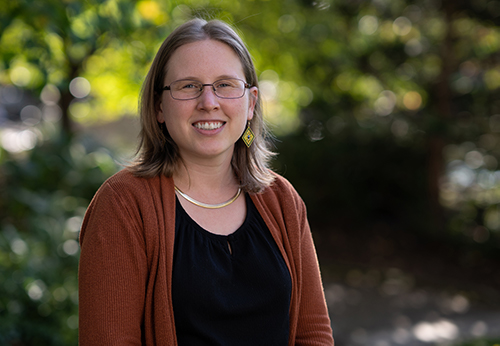Alexandra (Lexy) deGraffenreid, Assistant University Librarian for Special Collections Technical Services: Q&A
 Bio:
Bio:

Before joining Prnceton University Library (PUL) Lexy was the Head of Collection Services at the Eberly Family Special Collections Library, Pennsylvania State University Libraries where she managed collection ingest, accessioning, digital projects, processing, stacks management, and coordination with conservation. Prior to that she acquired extensive processing experience there and at The History Factory, where she managed the archives of seven corporate and nonprofit clients. At Penn State, she arranged and described several collections, including the Toby and Betty Bruce collection of Ernest Hemingway. She also co-implemented remedial description workflows as part of the Inclusive Description Working Group, including Penn State’s first bilingual collection guides (Los documentos de Luis Alberto Sánchez/Luis Alberto Sánchez papers), Statement on More Inclusive Archival Collections, and Inclusive Description Style Guide.
A graduate of the University of Mary Washington (BA in History and International Affairs) and the University of Michigan (MSI with a specialization in archives and records management), she interned at the Bentley Historical Library as well as the University of Ghana. She has also presented and published on issues relating to both technical standards and remedial description.
Can you tell us about your role as Assistant University Librarian for Special Collections Technical Services?
I lead the Archival Description & Processing Team (ADAPT) and Collections Services Team (CST) within the Special Collections Library. My teams ensure that all materials in Special Collections are properly housed, discoverable, and accessible to our researchers. In particular, I oversee all archival arrangement & description, basic cataloging, archival storage management, digital curation, and the accessioning of newly received materials.
Is there a specific area of this role you’re drawn to?
I am really drawn to the work Special Collections is doing to make our collections more equitable and inclusive, from ensuring that our diverse archival collections are more respectfully described to conducting usability testing on our finding aids website to best serve our research community. I am looking forward to helping these efforts to make Special Collections more welcoming and accessible to researchers from all backgrounds.
Are there any pieces in our collection that you are particularly interested in?
This is a difficult question because I am still learning about our vast collections! At this stage, I would say that I am most interested in our archival collections relating to Latin American writers. I have a personal interest in Latin American history and literature, and so I find being part of preserving and facilitating research into these authors to be particularly exciting.
What types of students and researchers do you hope to serve in this role?
My job is to make sure all of Special Collections' materials are discoverable by any researcher who comes through our doors. I hope to make sure that our collections are accessible to a broad researcher community, including students who have never done archival research before as well as professional scholars. I want to help make all researchers feel welcome and included in Special Collections' spaces.
What are your goals for your first year at PUL?
As the new manager of an existing team, my main goal this year is to develop collaborative relationships with Special Collections team members as well as PUL stakeholders, and to develop a thorough understanding of Special Collections workflows and collections.
Published on March 7, 2024
Interview by Brandon Johnson, Communications Strategist
Media Contact: Stephanie Oster, Publicity Manager
Newsletter
Subscribe to Princeton University Library’s e-newsletter for the latest updates on teaching and research support, collections, resources, and services.
